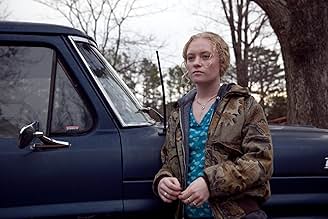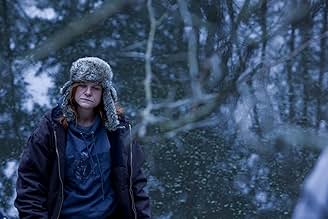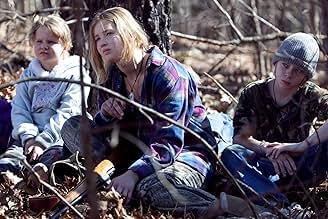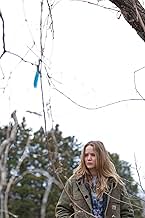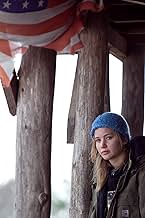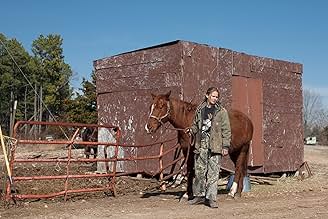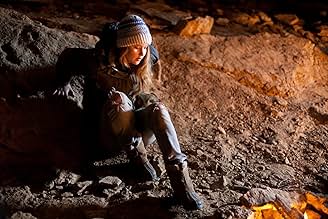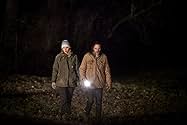Winter's Bone
Une fille indomptable des Monts Ozark traverse un terrain social dangereux, alors qu'elle pourchasse son dealer de père, tout en essayant de sauver sa famille.Une fille indomptable des Monts Ozark traverse un terrain social dangereux, alors qu'elle pourchasse son dealer de père, tout en essayant de sauver sa famille.Une fille indomptable des Monts Ozark traverse un terrain social dangereux, alors qu'elle pourchasse son dealer de père, tout en essayant de sauver sa famille.
- Nommé pour 4 Oscars
- 63 victoires et 131 nominations au total
Philip Burnley
- Baby Ned
- (as Phillip Burnley)
Histoire
Le saviez-vous
- AnecdotesJennifer Lawrence was originally turned down for the role of Ree for being "too pretty." She flew overnight into New York City, walked 13 blocks in the sleet to the casting office, and auditioned with a runny nose and hair she hadn't washed in a week. Lawrence won the role, and ultimately, her first Academy Award nomination (for Best Actress) at 20 years old.
- GaffesFLIPPED SHOT: When the sheriff first talks to Ree, the neighbor walks past a truck to eavesdrop. The truck's logo and license plate are reversed, as if in a mirror.
- ConnexionsFeatured in The Rotten Tomatoes Show: The A-Team/The Karate Kid/Winter's Bone (2010)
- Bandes originalesThe Missouri Waltz
(1914)
Words by J.R. Shannon
Music by John Valentine Eppel
a.k.a. "Hush-a'bye, Ma Baby"
Performed a capella by Marideth Sisco
Commentaire à la une
It is quite astonishing what people are capable of when their survival or way of life is threatened. In those moments, they are somehow able to employ a level of courage, perseverance, and high intention that they never knew they had. Such is the case for young Ree Dolly (Jennifer Lawrence) in Debra Granik's The Winter's Bone, winner of the Jury Prize for dramatic competition as well as the Waldo Salt Screen writing Award at the Sundance Film Festival. Newcomer Lawrence, a Kentucky native, is completely convincing as the 17-year-old Ree who has endured much in her brief lifetime and has plenty of obstacles yet to overcome. Living in poverty in a small house in the rural Missouri Ozarks, near the Arkansas border, she has to cook, chop wood and do whatever is necessary to care for her twelve-year old brother Sonny (Isaiah Stone) and her six-year old sister Ashlee (Ashlee Thompson) as well as look after her mother who is catatonic.
Based on the novel by Daniel Woodrell and co-written by Granik and Anne Rosellini, The Winter's Bone depicts how young Ree's life is changed when the local sheriff informs her that her dad, Jessup, on the run after being arrested for "cooking" methamphetamines, has put the family's house up as bond and that, unless he is found and convinced to turn himself in, Ree's family will lose their house. Insisting to the sheriff that she will find him, the young girl begins a search among friends, family members, distant relatives, and the community of small-time crooks, dope dealers, and kingpins that dominate the male-dominated rural society. No one wants to talk and Ree is met with silence, hostility, and even violence. One neighbor tells her that her questioning is, "a real good way to end up et by hogs." When someone asks her, "Ain't you got no men folk to do this?" the answer is an emphatic "no." (at times, the film seems to be challenging Juno for the most quirky one-liners).
Ree's main antagonists are her father's terrifying older brother Teardrop, played by John Hawkes, and Merab (Dale Dickey), the wife of Thump Milton, one of the local bosses. The performance by Dickey conveys an overbearing sense of intimidation that is both real and frightening. As Ree navigates through this hostile environment, we grow to admire her determination and her willingness to confront danger in order to protect her siblings. Winter's Bone is a film about poverty and desperation but it never exploits its characters or engages in manipulation or sentimentality. Though it can be hard to watch at times, it is not as some critics have said "poverty porn." There are lighter moments as well that include authentic Ozark folk music sung by Marideth Sisco and scenes of Ree teaching her brother and sister to spell, count, and perhaps more important for survival, how to shoot a rifle. She also tells her younger brother about the culture in which they live saying "Never ask for what ought to be offered."
Though I was riveted by the unfolding story, perhaps because of the film's high degree of stylization, I stopped short of full emotional involvement and was often conscious of the fact that I was watching a movie. Yet The Winter's Bone is a rich, satisfying film that more than deserves the accolades it has been receiving. Though it is stylized, it has an authenticity derived from using local residents as actors and from the director having immersed herself in the culture for two years before shooting the film. Jennifer Lawrence conveys a stoic and hard-edged individual, yet one with integrity who has somehow avoided getting sucked into the soul destructive way of life that seems to be endemic to the area. In Ree, Granik has created one of the strongest female characters in cinema in memory, one who, by her sheer will, suggests what could be accomplished if all of us could live each day as if our life depended on it.
Based on the novel by Daniel Woodrell and co-written by Granik and Anne Rosellini, The Winter's Bone depicts how young Ree's life is changed when the local sheriff informs her that her dad, Jessup, on the run after being arrested for "cooking" methamphetamines, has put the family's house up as bond and that, unless he is found and convinced to turn himself in, Ree's family will lose their house. Insisting to the sheriff that she will find him, the young girl begins a search among friends, family members, distant relatives, and the community of small-time crooks, dope dealers, and kingpins that dominate the male-dominated rural society. No one wants to talk and Ree is met with silence, hostility, and even violence. One neighbor tells her that her questioning is, "a real good way to end up et by hogs." When someone asks her, "Ain't you got no men folk to do this?" the answer is an emphatic "no." (at times, the film seems to be challenging Juno for the most quirky one-liners).
Ree's main antagonists are her father's terrifying older brother Teardrop, played by John Hawkes, and Merab (Dale Dickey), the wife of Thump Milton, one of the local bosses. The performance by Dickey conveys an overbearing sense of intimidation that is both real and frightening. As Ree navigates through this hostile environment, we grow to admire her determination and her willingness to confront danger in order to protect her siblings. Winter's Bone is a film about poverty and desperation but it never exploits its characters or engages in manipulation or sentimentality. Though it can be hard to watch at times, it is not as some critics have said "poverty porn." There are lighter moments as well that include authentic Ozark folk music sung by Marideth Sisco and scenes of Ree teaching her brother and sister to spell, count, and perhaps more important for survival, how to shoot a rifle. She also tells her younger brother about the culture in which they live saying "Never ask for what ought to be offered."
Though I was riveted by the unfolding story, perhaps because of the film's high degree of stylization, I stopped short of full emotional involvement and was often conscious of the fact that I was watching a movie. Yet The Winter's Bone is a rich, satisfying film that more than deserves the accolades it has been receiving. Though it is stylized, it has an authenticity derived from using local residents as actors and from the director having immersed herself in the culture for two years before shooting the film. Jennifer Lawrence conveys a stoic and hard-edged individual, yet one with integrity who has somehow avoided getting sucked into the soul destructive way of life that seems to be endemic to the area. In Ree, Granik has created one of the strongest female characters in cinema in memory, one who, by her sheer will, suggests what could be accomplished if all of us could live each day as if our life depended on it.
- howard.schumann
- 26 juin 2010
- Permalien
Meilleurs choix
Connectez-vous pour évaluer et suivre la liste de favoris afin de recevoir des recommandations personnalisées
Détails
Box-office
- Budget
- 2 000 000 $US (estimé)
- Montant brut aux États-Unis et au Canada
- 6 531 503 $US
- Week-end de sortie aux États-Unis et au Canada
- 84 797 $US
- 13 juin 2010
- Montant brut mondial
- 13 796 834 $US
- Durée1 heure 40 minutes
- Couleur
- Mixage
- Rapport de forme
- 1.85 : 1
Contribuer à cette page
Suggérer une modification ou ajouter du contenu manquant








